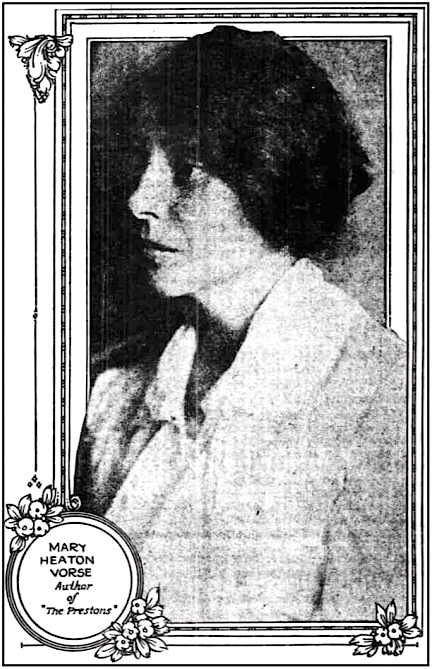 ———-
———-
Hellraisers Journal – Sunday November 2, 1919
Pittsburgh, Pennsylvania – Steel Strikers’ Fight for Freedom Goes On
From The Quarry Workers Journal of November 1919:
CONDITIONS AMONG COAL STRIKERS
AS SEEN BY A WOMAN
—–
By Mary Heaton Vorse,
Author of “The Prestons.” Etc.
—–[Part II.]
Life is hard enough under ordinary conditions for the steel workers’ wives. They live in joyless towns, their men never had a chance to get really rested; there is always a new baby, and most of them remain forever strangers for they never have time or opportunity to learn English.
Lately the senators have talked about Americanization of the foreign workers. They will have to humanize the steel industry first. They will have to teach such men as Judge Gary the elementary things concerning Americanism.
In times of strike, terror and suspense are added to the lives of the women. Fear of want is their constant companion. How do they stick it out? How can they have such endurance and fortitude? In every town the men are constantly being arrested. The shadow of the constabulary is forever over the strikers.
The bosses make house to house canvasses and play upon the fears and credulity of the women, and yet you find them-like the mother of the laughing children-ready to wait two or three weeks more so that someone needier than herself would have first chance at commissary stores. Holding on in the face of sneering threats, holding on with want just around the corner, holding on with hunger waiting in ambush. Holding on in spite of the appealing hands of children plucking forever at their skirts, reminding them that it is they in the last analysis who are going to suffer.
You see sights every day in the steel towns that would break your heart. I went up one of Homestead’s filthy alleys where man is the only thing not vile that you see, where the wide kind faces of a Slovak or Croatian woman shines out at you from the squalor-wide, calm looking women with the tranquil eyes of those who look over the wide spaces of the country, the brown sun and wind still in their cheeks.
As I walked past, one of these women snatched a tow-headed baby from the ground and rocked it back and forth, laughing, swaying with it with that cradling gesture which is part of a mother’s instinct. There was something very sweet and everlastingly good about that woman. She had left the village where she, was born to follow her man to this country, and here she was in a Homestead alley, singing in Croatian to the tow-headed baby so that the men playing cards nearby smiled up at her.
Beside her stretched out on a frame was clean, white curtain. There is a whole story of aspiration in the curtains that the mill workers’ wives keep washed and white. It is the fashion among them to have this one little luxury. These curtains fluttering out of windows say to everybody who chooses to interpret that these women want cleanliness and beauty so deeply, that they will pay in terms of fatigue and struggle to achieve a symbol of it.
The strike is about things like this. It is about that woman and the tow-headed baby. It is about the children that laughed in the sunless courtyard. For strikes are not abstract things, they are about life. You follow wages, hours, working conditions, and they will always lead you to one place, they will lead you back to a home and a woman and a child waiting in it. They lead you back to the things you want for that child, a place to play in now, and a better world to work in when he grows up.
So the fight for freedom goes on, builded on countless acts of sacrifice. Not even a steel corporation can kill the gift which these people have brought to this country, though buried in the mean streets are the bright treasures of hopes the hundreds of thousands of men and women had with them when they came. They all came seeking freedom and opportunity. The savage thunder of the mills deafened them, and the darkness of the mines has blinded them, but only for a while, and then instead of seeking for freedom, they fight for it. You can check them, but you cannot stop them.
The steel strike is one of the decisive labor battles of history. It does not concern merely the mill workers and their wives, it concerns all of organized labor. No one can turn upon it indifferent eyes, whoever he may be or whatever his trade.
The strikers are on the firing line, but it takes more than combat troops to win a great war. Wars are won through a whole country standing behind men under fire. That is the business of all of us. It is the business of everyone of us to see that the least of these sacrifices shall not have been made in vain.
———-
[Photograph, emphasis and paragraph breaks added.]
~~~~~~~~~~~~~~~~~~~~~~
SOURCE
The Quarry Workers Journal
(Barre, Vermont)
-Nov 1, 1919
https://www.newspapers.com/image/405049859
IMAGE
MHV, Author of Prestons, NYS p37, Dec 1, 1918
https://chroniclingamerica.loc.gov/lccn/sn83030431/1918-12-01/ed-1/seq-37/
See also:
Hellraisers Journal – Saturday November 1, 1919
Mary Heaton Vorse: A Woman’s View of Conditions Among the Steel Strikers of Pittsburgh, Part I
Article also found published in December 1919 edition of Machinists Monthly Journal:
https://play.google.com/books/reader?id=QANJAQAAMAAJ&hl=en&pg=GBS.PA1122
Tag: Great Steel Strike of 1919
https://weneverforget.org/tag/great-steel-strike-of-1919/
Tag: Mary Heaton Vorse
https://weneverforget.org/tag/mary-heaton-vorse/
Men and Steel
-by Mary Heaton Vorse
New York, Boni and Liveright, 1920
https://archive.org/details/mensteel00vors/page/n5
Mary Heaton Vorse
https://en.wikipedia.org/wiki/Mary_Heaton_Vorse
https://spartacus-educational.com/USAvorse.htm
~~~~~~~~~~~~~~~~~~~~~~~~~~~~~~~~~~~~~~~~~~~~~
Which Side Are You On? – Natalie Merchant


